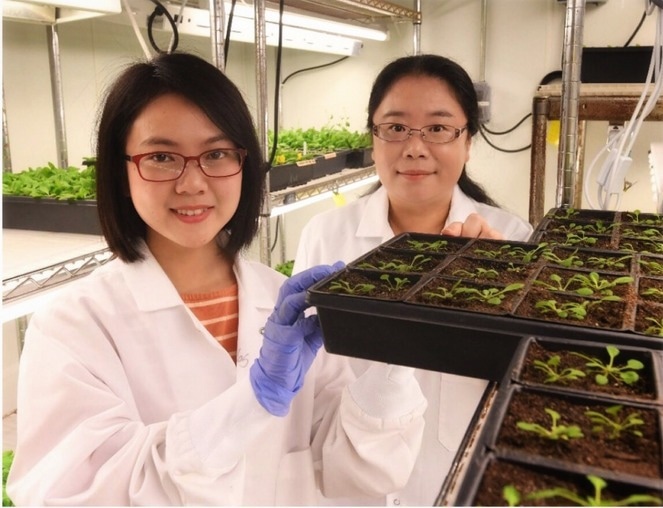Most people do not realize that fatty acids can be found in a nutritious salad. Although fatty acids, lipids, and fats may seem unappealing, they are essential to human life and to the plants that are consumed. They influence specific proteins in a way that controls how plants grow.
 Two of the study’s authors, Dr. Ye Xia (right) and Zhenzhen Zhao. Image Credit: Dr. Ye Xia
Two of the study’s authors, Dr. Ye Xia (right) and Zhenzhen Zhao. Image Credit: Dr. Ye Xia
Plant fatty acids (FAs) are parts of cell membrane structure and, among other things, the building blocks of certain hormones. Acyl carrier proteins (ACPs), which are present in all branches of life and support and extend the growing FA chains, stabilize fatty acids during synthesis.
By establishing a clear connection between FA biosynthesis and the plant defense system, a recent study by Zhenzhen Zhao (of The Ohio State University) and colleagues adds a new perspective to the role of FA biosynthesis in plants.
The results of the study, which were reported in Molecular Plant-Microbe Interactions (MPMI), showed that Arabidopsis plants lacking the Acyl Carrier Protein 1 (ACP1) were more impervious to the bacterial pathogen Pseudomonas syringae, demonstrating the crucial role that FA metabolism plays in plant immunity.
Our research provided a direct link between FA metabolism and plant immunity and unraveled the potential role of ACP1 in plant defense across economically important crops.”
Dr Ye Xia, Study Corresponding Author and Associate Professor, Biochemistry of Plant Pathogenesis and Immunity, Department of Plant Pathology, The Ohio State University
According to the study, ACP1 is necessary for preserving the homeostasis of hormones that influence a range of plant stress responses. ACP1 can now influence a variety of biotic and abiotic stressors due to its impact on hormone signaling, which opens up a wealth of potential applications.
The fact that ACP1 plays a role in plant resistance—different from that of its near family member, ACP4—also highlights the significance of investigating individual members of gene families that may have various functions.
Several economically significant crops currently contain ACP1 homologs. In the future, it will be possible to develop disease-resistant variants of these essential crops that can withstand infections from bacteria and other pathogens by genetically modifying them to adjust the expression of ACP1.
Source:
Journal reference:
Zhao, Z., et al. (2022). Involvement of Arabidopsis Acyl Carrier Protein 1 in PAMP-Triggered Immunity. Molecular Plant-Microbe Interactions. doi.org/10.1094/MPMI-02-22-0049-R